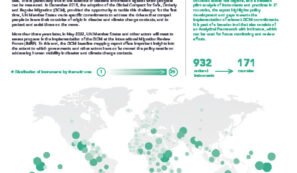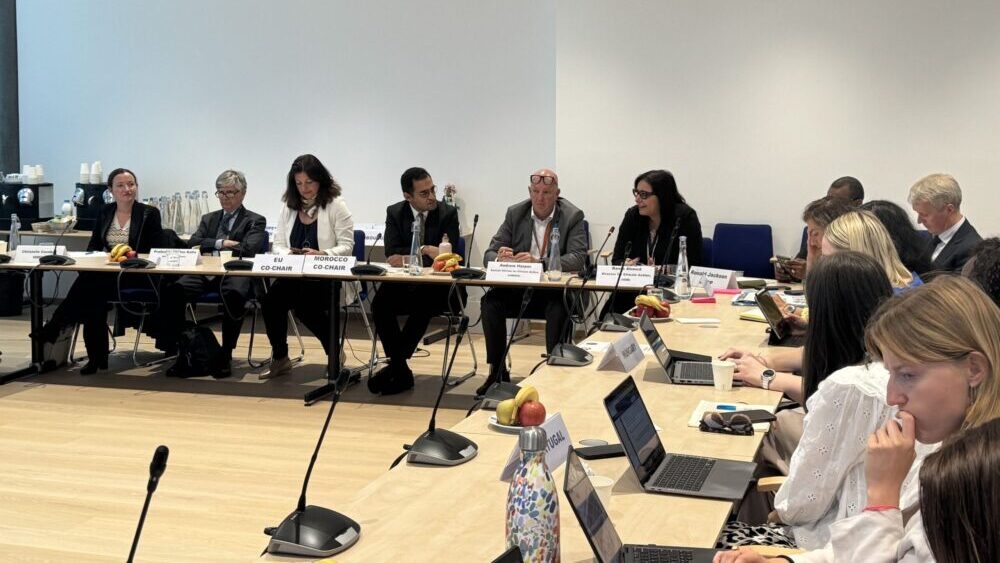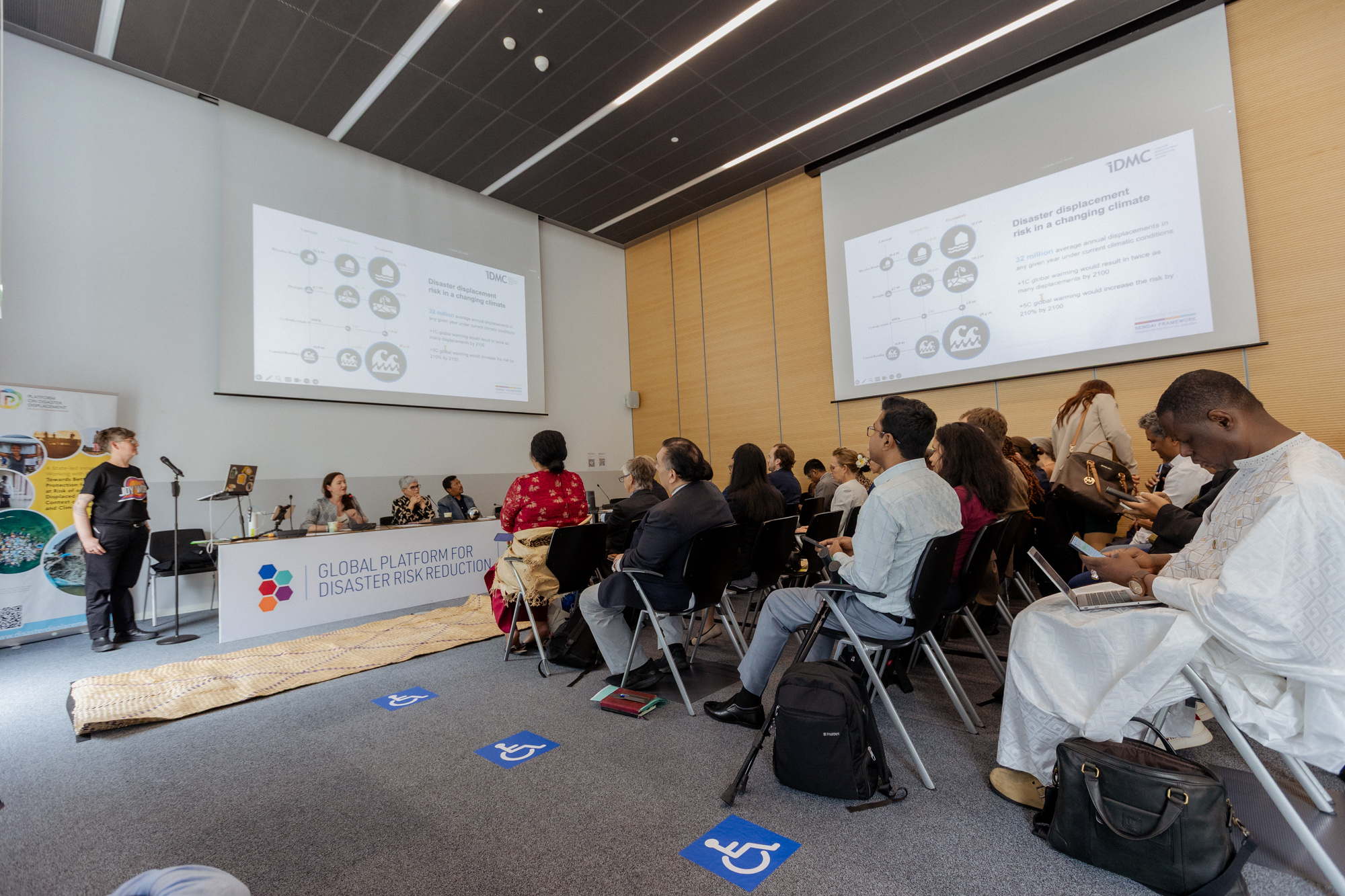Reporting Back from the 14th Global Forum for Migration and Development Summit
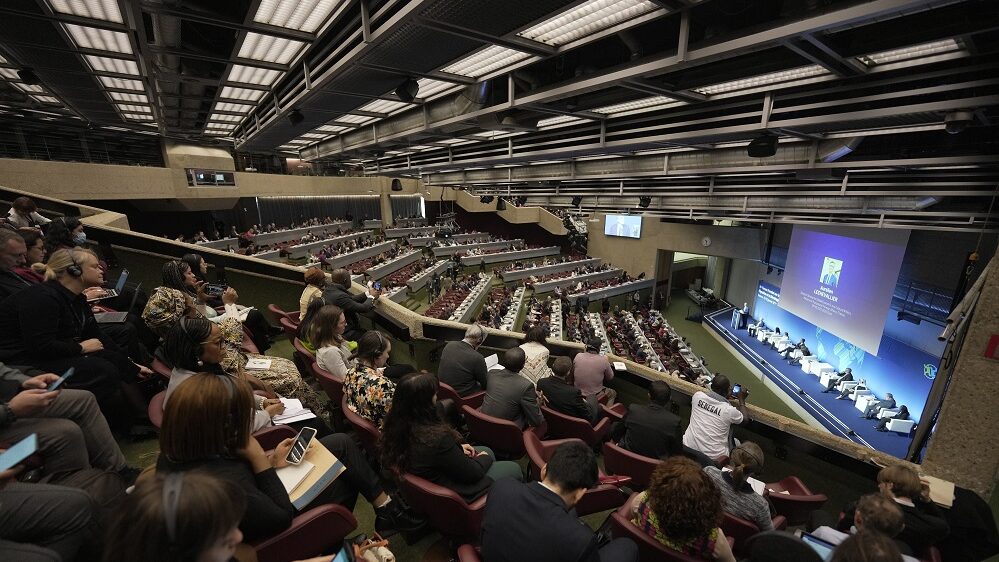
Human Mobility and Climate Change at the GFMD
The Summit provided an important setting for stakeholders including States, civil society actors and UN agencies to discuss human mobility in the context of disasters and climate change. Through both a High Level Panel on climate mobility as well as a Government Led Roundtable: Impact of climate change on human mobility, the Summit prompted discussions around regular migration pathways in the context of climate change, climate-resilient development, and data and funding.
Alongside its engagement in the main program, the PDD co-organized a side-event and two Marketplace exhibitions to promote innovative tools for, and approaches to, policy development – particularly around regular migration pathways in the context of disasters and climate change.
Innovative Tools for Policy Development
The PDD co-organized a side-event on Regular Pathways in the Age of Climate Change: Blending Policy, People, and Art with Secours Catholique – Caritas France, the Climate, Migration, and Displacement Platform, and the GFMD Civil Society Mechanism. The governments of Kenya, Fiji and Switzerland co-sponsored the event.
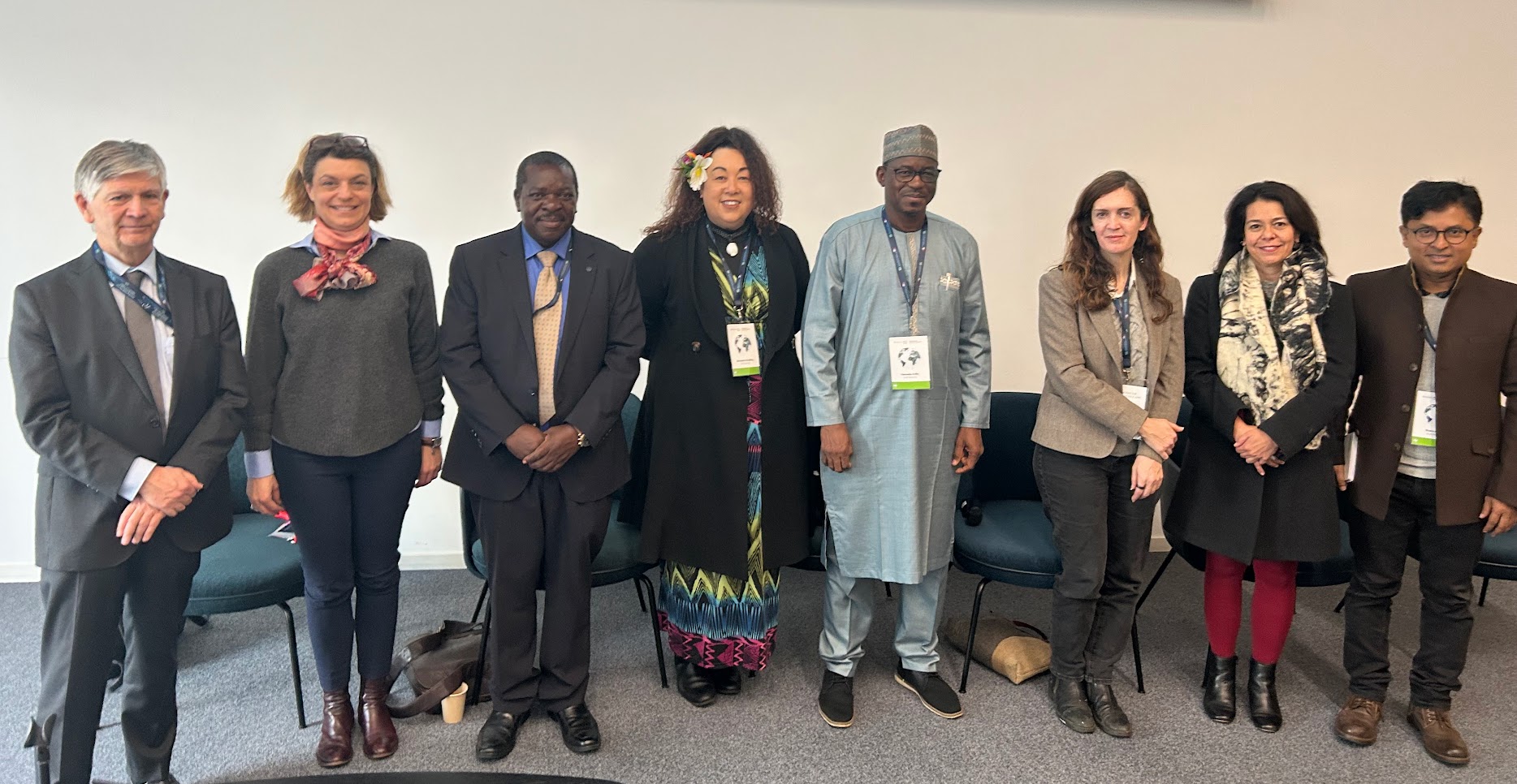
The panel featured civil society representatives from West Africa, South Asia, Latin America and the Pacific and explored how slow-onset climate events shape mobility patterns, as well as how this can be reflected and addressed in policy and practice. Speakers highlighted the distinct regional challenges faced by communities affected by climate change.
“Situations that in the Global North are assumed to be permanent and normal, such as having insurance for agriculture, are absolutely not normal in Latin America” – Helena Olea, Alianza Americas
“Disasters that are not of our making have put us in the Pacific on the frontline of climate change,” – Bernie Goulding, the Pacific Women’s Indigenous Network
The discussion afforded particular attention to the power of community storytelling and art to contextualize human mobility experiences in the context of climate change, trigger collective imagination and shape policy development. For example, artist Mary Mattingly presented how Ebb of a Spring Tide seeks to imagine what infrastructure development should look like to enable people to remain in place in the context of sea-level rise. She also presented Swale, a floating and mobile edible landscape on a reclaimed barge in New York City, where people could pick edible and medicinal perennial plants for free.
“I’ve been making art that I believed in because I really thought that I had nothing to lose, but I now understand that, collectively, if we don’t do anything, we really have everything to lose” – Mary Mattingly
Collective artist FLATFORM’s film was also screened at the event. That Which to Come Is Just a Promise, features the low-lying island nation of Tuvalu by presenting scenes of residents undertaking everyday activities in dry conditions that gradually shift to the same scenes taking place amidst puddles and flooded areas.
The CLIMB Database booth exhibition
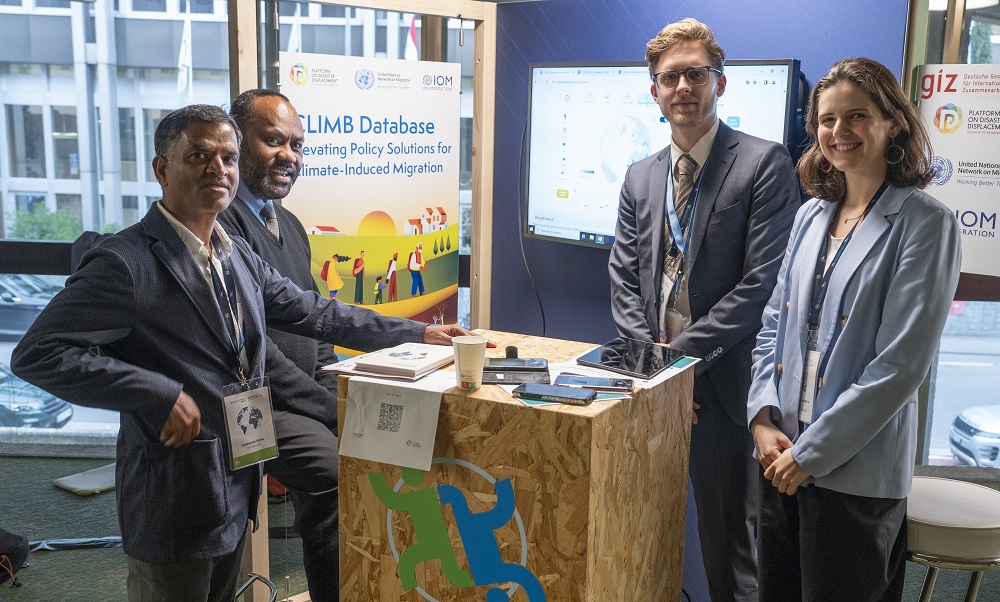
The Global Compact for Safe, Orderly and Regular Migration (GCM) explicitly addresses human mobility in the context of climate change through Objectives 2, 5, 21 and 23. In order to facilitate the implementation of these commitments and to complement the side-event discussions, the PDD, together with the International Organization for Migration (IOM), the UN Migration Network and the Deutsche Gesellschaft für Internationale Zusammenarbeit GmbH (GIZ), organized a Marketplace booth exhibition to present the CLIMB Database: Human Mobility in the Context of Disasters, Climate Change and Environmental Degradation. The Database consolidates over 1,500 legal and policy instruments addressing human mobility in the context of disasters, climate change and environmental degradation and, as such, constitutes an important tool to foster policy coherence and enhance evidence-based decision-making.
Through interactive presentations, live walk-throughs, and conversations with conference participants, the booth successfully stimulated discussions around the policy landscape, including challenges, gaps and opportunities for further expanding the database. The booth was visited by a range of actors working in the areas of human mobility, climate change, development, health, along with delegates from national and local governments, including mayors, and the GFMD Youth Delegation.
Art Meets Migration & Development in a Changing Climate booth exhibition
The importance of developing constructive narratives around migration was heavily emphasized at the GFMD. In addition to the artwork featured during the side-event, the PDD also promoted art and storytelling as important tool to shape policy discussions at a Marketplace booth exhibition.
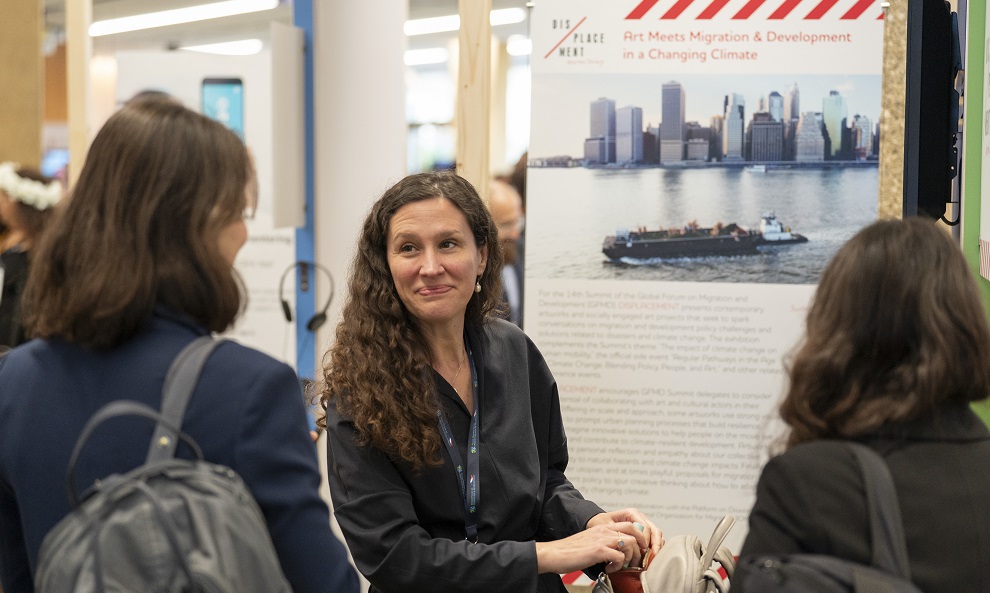
Organized in partnership with DISPLACEMENT: Uncertain Journeys and IOM, the exhibition presented contemporary and socially engaged art projects that seek to spark conversations on migration and development policy challenges and solutions related to disasters and climate change.
For instance, in HighWaterLine, artist Eve Mosher visualizes a “100 year flood” in New York City by tracing the ten feet above sea-level line in blue chalk using a machine typically used for marking baseball fields. As part of her 70 mile walk across New York City’s five boroughs, Mosher used the line to initiate conversations with local community members about the satellite imagery, NASA research, and other scientific and historical research that informed her project.
In Nansen’s Pastport, artist Anneli Skaar reimagines Fridtjof Nansen’s eponymous identity document, the Nansen passport, set in the context of today’s climate-related displacement and migration issues. The original work is a limited edition fine press book published by Two Ponds Press that includes copperplate illustrations, metal sculpture, and hand-bound cyanotype prints. For this exhibition, the artist recreated the interior pages of Nansen’s Pastport as lenticular prints, which enabled the viewer to “turn” the large-scale passport pages by moving in front of the images.
The artwork poses many questions: How can Nansen’s role in the past – both as explorer and humanitarian – inspire, unify, and inspire empathy in an age of partisanship around climate change and migration challenges? How do Nansen’s own words in post-Great War Europe resonate today? And lastly: one day, might we all have to leave our homes due to climate change?
Looking Ahead
As the momentum to address human mobility in disaster and climate change contexts continues to build across policy processes, the GFMD provides an important space to bridge these discussions. Looking ahead, the 15th GFMD offers a particularly timely opportunity in this respect as it will be chaired by Colombia, coinciding with the Cartagena 40+ Process as well as Colombia’s Chairmanship of the South American Conference on Migration (SACM). The PDD looks forward to supporting Colombia and partners throughout these processes.
Photos: GFMD Secretariat, PDD Secretariat

